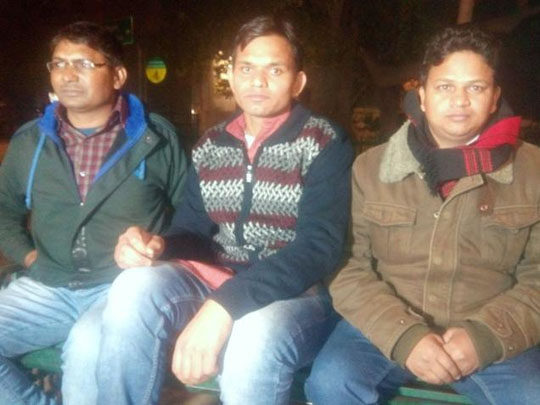Lucknow, Jan 23: Ram Karan Nirmal and Amrendra Kumar Arya found themselves surrounded by security personnel soon after raising slogans against Prime Minister Narendra Modi on Friday. Their mouths were forcibly shut as they were dragged away to preventive detention.

Shortly after he stepped out of custody, Mr. Nirmal, 31, was dissapointed and shocked to hear that the Babasaheb Bhimrao Ambedkar University officials cancelled his stay at the University hostel as a punitive measure. Mr. Nirmal finds a glaring similarity between his eviction and the harassment faced by Hyderabad scholar Rohith Vemula.
“I voiced my dissent. For that I was evicted from the Siddhartha Boys’ Hostel of the university and my boarding for the night cancelled even though my room was booked for two days. We had deposited Rs. 200 for the boarding,” said Mr. Nirmal, who was left to bear the nippy North Indian winter night without any roof. A copy of the hostel bill is with The Hindu.
'No sense of regret'
However, for the young Dalit men who shouted “Modi, go back,” “Modi Murdabad,” “Inquilab zindabad, Phule Ambedkar zindabad,” during the convocation ceremony on Friday, there is no sense of regret. In fact, they are “proud” of their act. “We feel like responsible citizens who have the right to dissent. If given a chance we will do it again,” said Mr. Arya, 24, an LLM graduate.
Mr. Nirmal and Mr. Arya were booked under Section 151 (disturbance of public peace) of the Indian Penal Code and sent to preventive custody. After a few hours, the police released them on a personal bond.
Dismissing any accusations of a publicity stunt, the two said they decided to stage a protest against Mr. Modi when they could not longer bear his silence around the death of Rohith Vemula.
The two claim no political affiliation and say the protest was staged solely on their own will.
“PM Modi tweets every minor and random thing — be it a Mayor election or wishing somebody on their birthday. But he has not said anything on issues of grave injustice, like the murders of Akhlaq, Dabolkar and Kalburgi,” said Mr. Arya.
The students belong to the Dalit community and hail from humble backgrounds. Mr. Nirmal, a Dhobi, is the son of a farmer from Kaushambi, while Mr. Arya’s father (a Jatav) is a retired gram panchayat secretary hailing from Sant Kabir Nagar.
Another student who participated in the sloganeering but was not held by the police was Surendra Nigam, a Pasi, who teaches at a private college in Mirzapur.
Mr. Arya and Mr. Nirmal live as roommates in New Delhi where they are both preparing for judicial entrance exams.
'We are worried by the trend'
During his speech, Mr. Modi broke his silence on the death of Rohith Vemula, saying that he could feel the agony of the scholar’s parents.
“What delayed him for so many days? Just because we protested he was forced to shed crocodile tears. He was forced to speak up merely for fear of losing Dalit votes in the 2017 elections,” Mr. Nigam said.
While the suicide of Vemula was the trigger to their outrageous protest, the Dalit youth say it was borne out of their growing frustration with the ‘saffronisation’ of educational institutes under the NDA government and its indifference towards Dalit students.
“There is institutionalised saffronisation at play. Talk of Mandir-Masjid instead of education. And as citizens we are worried by the trend. We thought of no better platform than this to get our voices heard,” said Mr. Nirmal, a gold medallist in human rights.
Though the police let off Mr. Nirmal and Mr. Arya with a warning, the men allege they were threatened of future consequences if they did not give up their ways. “If we were Muslim, we could so easily have been branded terrorists,” Mr. Nirmal said.
The two said they could relate to the experience of Vemula and the “internal discrimination” faced by the Dalits and Muslims in the country. “Every day we hear of discrimination against Dalits and Muslims. We see bias in every walk of life. We also have been mentally harassed in our university, BBAU, which faces institutionalised bias. Through our protest, we wanted to call out every atrocity faced by students like Rohith,” Mr. Arya said.





Comments
Why ?why ?and another why ? Islamic universities and colleges are always open for our Dalit brothers.
well done guys.. congratulations for your bravery..
wish still more students will raise voice against modi and his terrorist groups like RSS, BJP, VHP, BD n all
Add new comment